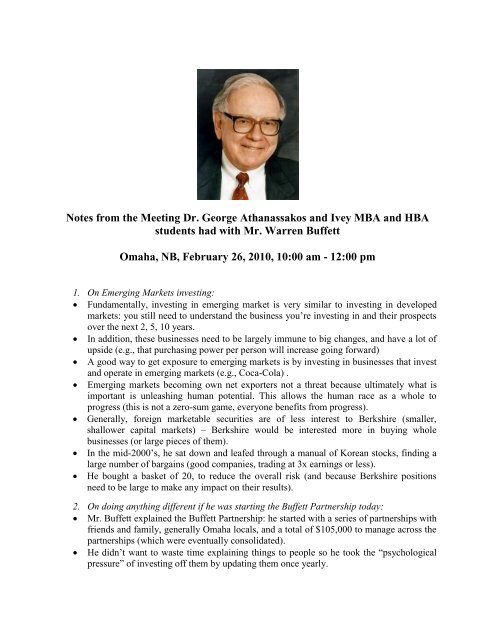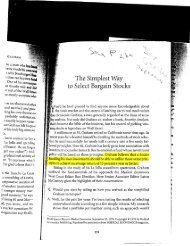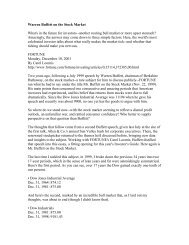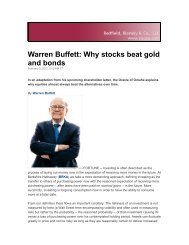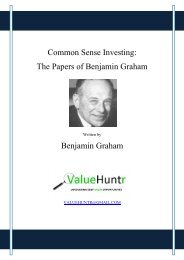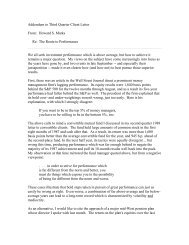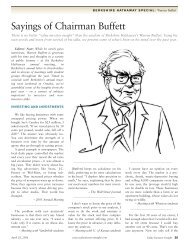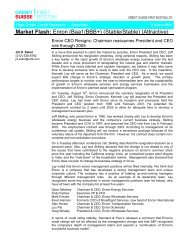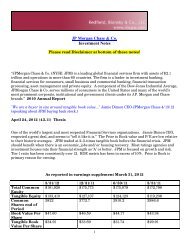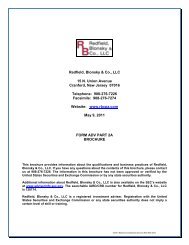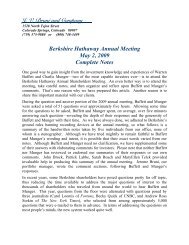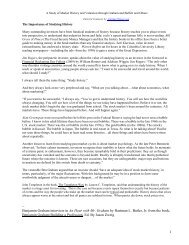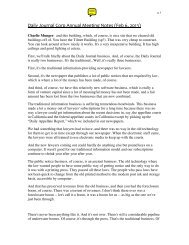Notes from the Meeting Dr. George Athanassakos and - The Ben ...
Notes from the Meeting Dr. George Athanassakos and - The Ben ...
Notes from the Meeting Dr. George Athanassakos and - The Ben ...
- No tags were found...
You also want an ePaper? Increase the reach of your titles
YUMPU automatically turns print PDFs into web optimized ePapers that Google loves.
<strong>Notes</strong> <strong>from</strong> <strong>the</strong> <strong>Meeting</strong> <strong>Dr</strong>. <strong>George</strong> <strong>Athanassakos</strong> <strong>and</strong> Ivey MBA <strong>and</strong> HBAstudents had with Mr. Warren BuffettOmaha, NB, February 26, 2010, 10:00 am - 12:00 pm1. On Emerging Markets investing: Fundamentally, investing in emerging market is very similar to investing in developedmarkets: you still need to underst<strong>and</strong> <strong>the</strong> business you’re investing in <strong>and</strong> <strong>the</strong>ir prospectsover <strong>the</strong> next 2, 5, 10 years. In addition, <strong>the</strong>se businesses need to be largely immune to big changes, <strong>and</strong> have a lot ofupside (e.g., that purchasing power per person will increase going forward) A good way to get exposure to emerging markets is by investing in businesses that invest<strong>and</strong> operate in emerging markets (e.g., Coca-Cola) . Emerging markets becoming own net exporters not a threat because ultimately what isimportant is unleashing human potential. This allows <strong>the</strong> human race as a whole toprogress (this is not a zero-sum game, everyone benefits <strong>from</strong> progress). Generally, foreign marketable securities are of less interest to Berkshire (smaller,shallower capital markets) – Berkshire would be interested more in buying wholebusinesses (or large pieces of <strong>the</strong>m). In <strong>the</strong> mid-2000’s, he sat down <strong>and</strong> leafed through a manual of Korean stocks, finding alarge number of bargains (good companies, trading at 3x earnings or less). He bought a basket of 20, to reduce <strong>the</strong> overall risk (<strong>and</strong> because Berkshire positionsneed to be large to make any impact on <strong>the</strong>ir results).2. On doing anything different if he was starting <strong>the</strong> Buffett Partnership today: Mr. Buffett explained <strong>the</strong> Buffett Partnership: he started with a series of partnerships withfriends <strong>and</strong> family, generally Omaha locals, <strong>and</strong> a total of $105,000 to manage across <strong>the</strong>partnerships (which were eventually consolidated). He didn’t want to waste time explaining things to people so he took <strong>the</strong> “psychologicalpressure” of investing off <strong>the</strong>m by updating <strong>the</strong>m once yearly.
Mr. Buffett started working as a stockbroker, but admitted he wasn’t <strong>the</strong> best salesman<strong>and</strong> wanted to do <strong>the</strong> real analytical work of investing for himself <strong>and</strong> investors.His only regret is that he did not start young enough (his first stock purchase occurred at<strong>the</strong> age of 11).3. On his “Inner Scorecard”: Mr. Buffett’s first advice was to “marry up”; you can’t choose your parents, but you canchoose your spouse (he also said to marry someone with “low expectations”) He also talked about making sure to have <strong>the</strong> right heroes in life (he mentioned some ofhis, including Howard Buffett <strong>and</strong> <strong>Ben</strong> Graham). He discussed an elderly Polish Holocaust survivor in Omaha who had passed awaywithin <strong>the</strong> past year. Mr. Buffett said he believed being really successful in life meant that, at <strong>the</strong> age of 60 or70, <strong>the</strong>re were plenty of people willing to “hide you” (that is, if <strong>the</strong>y were in a situationlike his Holocaust analogy, would <strong>the</strong>y be willing to put <strong>the</strong>ir life on <strong>the</strong> line to saveyours?).4. On Berkshire Hathaway’s (BRK-A, BRK-B) acquisition of Burlington Nor<strong>the</strong>rn Santa Fe: Buffett talked about railroads <strong>and</strong> <strong>the</strong>ir synchronization with <strong>the</strong> overall long-term goalsof <strong>the</strong> US economy, as well as some of <strong>the</strong>ir underlying fundamentals: 40% of goodsmove through <strong>the</strong> US via rail, low C02 emissions (can move 480 miles on 1 gallon ofdiesel), as well as <strong>the</strong> capital intensity (multi-billion dollar gap exists between BNSF’scapex <strong>and</strong> D&A). Buffett mentioned that although BNSF’s performance is down 16% <strong>from</strong> 2008 levels, hethinks that more goods will be moving around <strong>the</strong> country by rail 10-20 years <strong>from</strong> now<strong>and</strong> that BNSF will be earning “decent returns on capital”. In addition to Berkshire’s previous ownership in BNSF, he mentioned that he viewed <strong>the</strong>west, where BNSF operates, is more attractive than <strong>the</strong> east. <strong>The</strong> idea came about in a meeting he had with Matt Rose, BNSF’s CEO, when he was inFort Worth visiting DTI, Justin Boot <strong>and</strong> ACME Bricks. He contrasted BNSF with See’s C<strong>and</strong>ies, which have very low turnover using very littlecapital (pre-tax $70m on $40m in capital), while rail businesses are capital intensive <strong>and</strong>low-return businesses. He talked about See’s pricing power: every Dec 26 th , <strong>the</strong> price increases by 1 cent (atChristmas <strong>and</strong> Valentine’s Day, when <strong>the</strong>y do most of <strong>the</strong>ir business, no one is willing to“low-ball” on such a product); <strong>the</strong> problem with See’s, unlike BNSF, is that it offers littlescale or opportunity to re-deploy capital. BNSF is a good investment largely because of <strong>the</strong> opportunities it offers to re-deploycapital at fairly high rates of return (e.g., tracks, bridges, tunnels, locomotives, etc.).5. On <strong>the</strong> US Federal Debt <strong>and</strong> its implications for future generations: With respect to <strong>the</strong> deficit level, Mr. Buffett says it is actually 60% of GDP due to trustfunds (not 80%). Mr. Buffett mentioned that <strong>the</strong> deficit was at 120% at <strong>the</strong> end of WW2, <strong>and</strong> we had a farbrighter period post-WW2 versus pre-WW2.
He said that you can’t really promise medical equipment 20 years in <strong>the</strong> future: <strong>the</strong> output/ capital might increase, but <strong>the</strong>y can promise anything away <strong>the</strong>y want <strong>and</strong> it may notnecessarily happen; things will have to adjust.Ambition <strong>and</strong> innovation have not died; Mr. Buffett doesn’t know where <strong>the</strong> next goodthings will come <strong>from</strong>, but he believes <strong>the</strong>y are coming.Mr. Buffett does worry about nuclear, chemical or biological warfare.Megalomaniacs couldn’t harm people on <strong>the</strong> scale that <strong>the</strong>y can now – <strong>the</strong>y have alwaysexisted <strong>and</strong> will continue to exist (“in fact nuts grow in proportion to <strong>the</strong> population”);<strong>the</strong> big difference is that only now <strong>the</strong>re are exponential growths in <strong>the</strong> possibility ofways to inflict harm on o<strong>the</strong>r people.We must consider: intent, knowledge, materials <strong>and</strong> deliverability in <strong>the</strong> consideration oflarge-scale attacks.Only material is a choke point now – Mr. Buffett thinks this must be continued to beemphasized <strong>and</strong> it is what worries him most.Mr. Buffett talked about how we all live better than John D. Rockefeller, who controlled<strong>the</strong> largest proportion of GDP of any person who ever lived in <strong>the</strong> US.We are warm or cold depending on preference, we can watch <strong>the</strong> World Series on TVwithout actually having to take a train <strong>the</strong>re, etc.Mr. Buffett vs. us: we generally consume <strong>the</strong> same things on a day-to-day basis (his suitsare more expensive, but <strong>the</strong>y look cheap on him, <strong>and</strong> he uses a private jet); wealth bringssome slight improvements in living, but overall it’s just toys.“Success is getting what you want; happiness is wanting what you get.”6. On whe<strong>the</strong>r or not <strong>the</strong>re is a bubble in <strong>the</strong> Chinese economy: Mr. Buffett declined to comment directly on Jim Chanos’s comments about <strong>the</strong> Chinesereal estate situation. Mr. Buffett described <strong>the</strong> US economy as having a structure that unleashed <strong>the</strong> potentialof <strong>the</strong> Gates’ <strong>and</strong> Fords of <strong>the</strong> world. China has taken elements of our system <strong>and</strong> naturally adapted <strong>the</strong>m to unleash <strong>the</strong>potential of 200 million people. Mr. Buffett went out of his way to say that we will not suffer if China does well – “did<strong>the</strong> rest of <strong>the</strong> world suffer <strong>from</strong> our prospering?” Mr. Buffett spoke about <strong>the</strong> success of BYD, which was founded in 1995 by a man whois now 43 years old <strong>and</strong> who has 130,000 employees <strong>and</strong> 13,000 engineers working forhim with <strong>the</strong> best-selling car in China (<strong>the</strong> world’s biggest car market). He gets his suits made-to-fit in China. “Nice for <strong>the</strong> home team to win every game, but it’s just not going to happen”: Mr.Buffett talked about <strong>the</strong> Lewis-Schmeling fight in 1938 (<strong>the</strong> whole world cared, but <strong>the</strong>fight made no money <strong>and</strong> only 25,000 people in Madison Square Garden could watch) Now hundreds of millions of dollars are made watching middleweight fighters on Payper-View,<strong>and</strong> <strong>the</strong> individual who invented <strong>the</strong> TV didn’t make anything – it’s <strong>the</strong> peoplewho use <strong>the</strong> TV to make money who made <strong>the</strong> money (“it would be great if China isinventing lots of stuff”).
7. On financial innovation over <strong>the</strong> last 30 years: Financial innovation is no different <strong>from</strong> innovation elsewhere – “<strong>the</strong>n why is it bad?” First, Mr. Buffett said that CDO-squared are not <strong>the</strong> most important issue at h<strong>and</strong> <strong>and</strong> thatextremes will always exist within <strong>the</strong> context of money. Mr. Buffett discussed an allegory whereby everyone in <strong>the</strong> room was shipwrecked on adeserted isl<strong>and</strong>, with everyone making rice to survive (where we can all survive off <strong>the</strong>rice by working in rice fields for 8 hours per day <strong>and</strong> would be satisfied). But what if20% of <strong>the</strong> people started trading rice futures <strong>and</strong> options, necessitating everyone else towork 9 hours a day? We are all worst off – like any “casino” type activity, what is <strong>the</strong> netbenefit to society? Mr. Buffett said that although life may not be equitable, <strong>the</strong>re is a lot of money “on WallStreet” <strong>and</strong> <strong>the</strong>re needs to be restraints. “<strong>The</strong> invisible h<strong>and</strong> sometimes gets out of h<strong>and</strong>”. “Derivatives are financial weapons of mass destruction”. It’s not all bad though: per point of IQ <strong>and</strong> energy, <strong>the</strong> most money is to be made on WallStreet, so how do we address <strong>the</strong> problems without “throwing <strong>the</strong> baby out with <strong>the</strong>bathwater?” Mr. Buffett believes that if things become extreme enough, <strong>the</strong> US will “do <strong>the</strong> rightthing” (e.g., <strong>the</strong> stimulus package). “It remains to be seen if we can have an enlightened market system without restraints –but when you have <strong>the</strong> privilege of <strong>the</strong> backing of <strong>the</strong> US government, you need tooperate within some rules. If you want to go it alone – fine”.8. On his most difficult challenge <strong>and</strong> how he overcame <strong>the</strong> adversity: Mr. Buffett doesn’t feel he has faced much adversity in his life. He believes he has beenexceptionally lucky. “I won what I like to call <strong>the</strong> ovarian lottery. I have nothing to complain about.” At <strong>the</strong> time I was born, <strong>the</strong>re was about <strong>and</strong> one in 50 chance I would be born in <strong>the</strong> US. Ihad good parents <strong>and</strong> a good education. I am white. I am male – my sisters are just as smart as I am, but even though we hadparents who didn’t tell <strong>the</strong>m what to do, <strong>the</strong>y got <strong>the</strong> message <strong>from</strong> society on what <strong>the</strong>ywere supposed to do. I am wired in a way that enables me to be good at capital allocation. I wasn’t accepted to Harvard, <strong>and</strong> this at <strong>the</strong> time seemed unlucky, but it was <strong>the</strong> bestthing that ever happened to me. I ended up at Columbia instead with Graham <strong>and</strong> Dodd “I have no muscles. I’m a poor physical specimen, but nothing seems to go wrong.”Doctors have said he is healthy! “It’s mentally destructive to think about what you don’t have.” If you had <strong>the</strong> opportunity to trade your life in <strong>and</strong> pick <strong>from</strong> 100 lives, r<strong>and</strong>omly drawn<strong>from</strong> <strong>the</strong> six billion in <strong>the</strong> world, would you do it? If you wouldn’t, <strong>and</strong> I don’t thinkanyone would, it is because you are lucky to be living in North America, to be intelligent<strong>and</strong> have <strong>the</strong> resources to get a good education. You are <strong>the</strong> luckiest 1% of humanity.9. On <strong>the</strong> importance of his character (specifically humility, patience <strong>and</strong> discipline):
Pick one classmate who you would want to go long on, or receive 10% of <strong>the</strong>ir earningsfor life. Think about people you like, admire, <strong>and</strong> who are productive. This person maynot have <strong>the</strong> highest IQ, but <strong>the</strong>y are high functioning. And you are betting <strong>the</strong>y will bevery successful. Now pick ano<strong>the</strong>r classmate who you would short. List <strong>the</strong> positivequalities of <strong>the</strong> successful students <strong>and</strong> <strong>the</strong> negative qualities of <strong>the</strong> unsuccessful student.<strong>The</strong> goal is to become <strong>the</strong> successful person by working to achieve <strong>the</strong>ir positive qualities<strong>and</strong> by eliminating <strong>the</strong> negative qualities <strong>and</strong> habits of <strong>the</strong> unsuccessful student. Develop<strong>the</strong> qualities you like in people, eliminate <strong>the</strong> qualities you don’t.Change <strong>the</strong> negative qualities while you’re young: “<strong>The</strong> chains of habit are too light to befelt until <strong>the</strong>y are too heavy to break.”Attracting good people to you will lead to success, more so than industry knowledge.10. On <strong>the</strong> transition of <strong>the</strong> US economy to a service-based economy (<strong>from</strong> a manufacturingdriveneconomy): Currently, we [<strong>the</strong> U.S.] send <strong>the</strong>m [<strong>the</strong> Chinese] pieces of paper <strong>and</strong> <strong>the</strong>y send us $225billion in things that we want to buy. Why don’t <strong>the</strong>y just keep <strong>the</strong> money <strong>the</strong>y have <strong>and</strong><strong>the</strong> goods <strong>the</strong>y produce? People just don’t think that way. <strong>The</strong> China-US dynamic cannot go on forever, <strong>and</strong> things that cannot go on forever…well… <strong>the</strong>y end. <strong>The</strong> advantage currently is that <strong>the</strong> US can denominate debts in its owncurrency. O<strong>the</strong>r countries can’t. <strong>The</strong> dynamic does not necessarily need to reverse. It ispossible for a steady state to exist. It is thought to be in <strong>the</strong> interest of <strong>the</strong> countriesinvolved to maintain <strong>the</strong> current system, <strong>and</strong> it will probably exist for a while. If <strong>and</strong>when it does end, it won’t be <strong>the</strong> end of <strong>the</strong> world. <strong>The</strong> money doesn’t disappear, it justgoes into o<strong>the</strong>r pockets. China’s current arrangement is to import goods <strong>and</strong> receive cash. This will likely notchange for some time.11. On judging management at Berkshire holdings <strong>and</strong> potential investments: Buy a business so good that an idiot could run it, because sooner or later, one will. I always ask myself, “Does <strong>the</strong> owner love <strong>the</strong> business, or do <strong>the</strong>y love <strong>the</strong> money?”<strong>The</strong>re needs to be passion. O<strong>the</strong>rwise <strong>the</strong> contract will not keep <strong>the</strong>m mentally <strong>the</strong>re, or<strong>the</strong>re for <strong>the</strong> long-term. To ensure <strong>the</strong>y don’t lose <strong>the</strong>ir passion for <strong>the</strong> business, <strong>and</strong> promise <strong>the</strong>m <strong>the</strong>y will get to“paint <strong>the</strong>ir own painting,” <strong>and</strong> I won’t take it away <strong>from</strong> <strong>the</strong>m by giving too muchdirection. Mr. Buffett loves his job because he gets to paint his own painting, <strong>and</strong> he gets applause.Good managers are someone with a similar equation. Mr. Buffett will give his managersapplause <strong>and</strong> he let’s <strong>the</strong>m paint <strong>the</strong>ir own painting. Managers at Berkshire don’t havecontracts. Berkshire has never purchased <strong>from</strong> a private equity company, because <strong>the</strong>y are in lovewith <strong>the</strong> money, not <strong>the</strong> business. That’s not a bad thing, but it’s just not for WarrenBuffett. It’s not a healthy environment when everyone is vying for <strong>the</strong> top job. For example, atGE <strong>the</strong>re wil be 40 executives who want <strong>the</strong> top job. When <strong>the</strong> new CEO position isannounced, those who weren’t picked leave <strong>the</strong>ir jobs right away. Like that, you lose 39
of your best people <strong>and</strong> keep one. At Berkshire, people love <strong>the</strong>ir own jobs. No one wantsmy spot because <strong>the</strong>y are all passionate about <strong>the</strong>ir own job.Take <strong>the</strong> job that turns you on <strong>and</strong> <strong>the</strong> money will follow. <strong>The</strong> goal is to be smarter at <strong>the</strong>end of <strong>the</strong> day, every day that you go to work. This is what kept Rose Blumkin (founderof Nebraska Furniture Mart) working until she was 103.When you have a choice, always feel excited about what you do. This is not alwayspossible. Mr. Buffett once sold shirts at Penny’s, <strong>and</strong> he didn’t like that.12. On his “all-in bet” on <strong>the</strong> US economy: How can you not bet on <strong>the</strong> US? 40 years after <strong>the</strong> invention of <strong>the</strong> telephone, it took <strong>the</strong> average person 53 hours to makeenough money to pay for a long-distance phone call that lasted 3 minutes. Look what youcan do for free now. This kind in development is fostered by <strong>the</strong> American system.13. On Coca-Cola’s acquisition of its leading North American bottler: <strong>The</strong> dumbest contracts in Coke’s history were <strong>the</strong> long-term licensing agreements withlarge bottlers with a fixed price on syrup. This is an inefficient bottling situation. Everybottler held on to <strong>the</strong>se licenses tightly. No one could touch <strong>the</strong>m, <strong>and</strong> Pepsi <strong>and</strong> Cokeeventually became like commodities. 80-90 of <strong>the</strong>se contracts still exist today, <strong>and</strong> Cokebought this large bottler in an attempt to reorganize <strong>the</strong> distribution channels <strong>and</strong>rationalize <strong>the</strong> distribution of <strong>the</strong> product. Coke is a good product. It’s one of <strong>the</strong> only products with zero taste memory. <strong>The</strong> fifthcoke of <strong>the</strong> day tastes as fresh as <strong>the</strong> first. You don’t get sick of <strong>the</strong> taste. (Mr. Buffettdrinks 5 or 6 cokes each day, equal to 750 calories <strong>from</strong> Coke each day. Mr. Buffet jokeshe owes half his life to Coke!) Coke is associated with happiness <strong>and</strong> sponsors <strong>the</strong>se types of events, like <strong>the</strong> Olympics.You want a br<strong>and</strong> to be associated with emotion. This extends to See’s C<strong>and</strong>y (aBerkshire subsidiary): If a guy buys his swee<strong>the</strong>art chocolate on Valentine’s Day <strong>and</strong> getsa kiss <strong>from</strong> her, this gives him a positive association with <strong>the</strong> br<strong>and</strong>!14. On his role as a public figure: Mr. Buffett won’t support anything he doesn’t believe in, regardless of whe<strong>the</strong>r it wouldhelp or harm Berkshire. He says he will speak his mind as he sees things. Mr. Buffett thinks he <strong>and</strong> Berkshire are under taxed compared to o<strong>the</strong>rs living in <strong>the</strong> US.He pays 16.6% tax on an income of $66 million. He doesn’t think this is fair, <strong>and</strong> says<strong>the</strong>re should be a dramatic change made to <strong>the</strong> system. He attributes <strong>the</strong> low tax rate to policies enacted under <strong>George</strong> Bush. “<strong>George</strong> Bush is mytax planner! He seems to think people like me are a dying breed <strong>and</strong> need to beprotected.”15. On Ethics … When something goes wrong, some people think you need better PR. <strong>The</strong> problem isyou’re doing something wrong. Some people want to play close to <strong>the</strong> lines, but <strong>the</strong>re is still lots of money to be madeplaying in <strong>the</strong> centre of <strong>the</strong> court Never trade reputation for money


